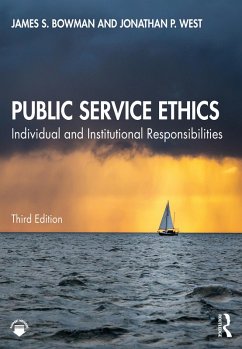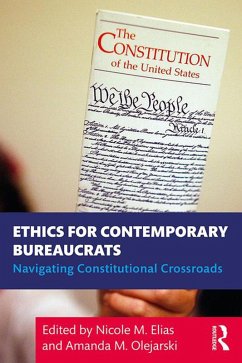
Empowering Public Administrators (eBook, PDF)
Ethics and Public Service Values
Redaktion: Olejarski, Amanda M.; Neal, Sue M.
Versandkostenfrei!
Sofort per Download lieferbar
41,95 €
inkl. MwSt.
Weitere Ausgaben:

PAYBACK Punkte
21 °P sammeln!
Public administrators need to be empowered to make difficult decisions. Acting in the public interest often means doing what is ethical even when it is an unpopular choice. Yet, too often, public servants at the local, state, and federal levels internalize the notion that their hands are tied and that they are limited in their ability to effect change. Empowering Public Administrators: Ethics and Public Service Values provides a much-needed antidote to inaction, offering a new lens for viewing administrative decision-making and behavior.This book makes a case for bringing historically signific...
Public administrators need to be empowered to make difficult decisions. Acting in the public interest often means doing what is ethical even when it is an unpopular choice. Yet, too often, public servants at the local, state, and federal levels internalize the notion that their hands are tied and that they are limited in their ability to effect change. Empowering Public Administrators: Ethics and Public Service Values provides a much-needed antidote to inaction, offering a new lens for viewing administrative decision-making and behavior.
This book makes a case for bringing historically significant theories to the forefront of public service ethics by applying them to a series of current ethical challenges in practice. Exploring administrative discretion as modern bureaucrats govern public affairs in a political context, this collection builds on the normative foundations of public administration and provides readers with a scaffold for understanding and practicing public service values. Questions for discussion and applications to practice are included in each chapter making this collection of interest to public affairs master's and doctoral students as well as public service practitioners.
This book makes a case for bringing historically significant theories to the forefront of public service ethics by applying them to a series of current ethical challenges in practice. Exploring administrative discretion as modern bureaucrats govern public affairs in a political context, this collection builds on the normative foundations of public administration and provides readers with a scaffold for understanding and practicing public service values. Questions for discussion and applications to practice are included in each chapter making this collection of interest to public affairs master's and doctoral students as well as public service practitioners.
Dieser Download kann aus rechtlichen Gründen nur mit Rechnungsadresse in A, B, BG, CY, CZ, D, DK, EW, E, FIN, F, GR, HR, H, IRL, I, LT, L, LR, M, NL, PL, P, R, S, SLO, SK ausgeliefert werden.













